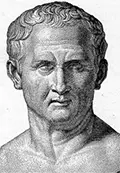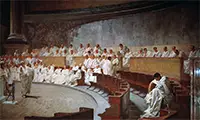Cicero: Defender of the Roman Republic
Cicero was a writer, lawmaker, and philosopher during the Roman Republic. He is most well-known for exposing the Catiline Conspiracy and for his political entanglements with Julius Caesar and Marc Antony. His speeches and writings have been influential in the history of philosophy and law for a great many years. 
He was born Marcus Tullius Cicero on Jan. 6, 106 B.C., in Arpinum, a town some 60 miles southeast of Rome. The son of a wealthy father who was a member of the second-highest class, the young boy enjoyed a classical education, reveling in the study of philosophy and rhetoric. He excelled in the study of law as well and argued his first case when he was 25. Before that, however, he served in the military, under Sulla during the Social War. In 79, Cicero went to Greece, where he spent two years furthering his studies. It was there that he met Titus Pomponius Atticus, another Roman student; the two were lifelong friends who corresponded regularly. During this time also, Cicero got married, to Terentia; they had two children together. 
Working his way up the cursus honorum, Cicero made quaestor in 75 B.C., aedile in 69, praetor in 66 B.C., and consul in 63 B.C. In this last position, he played a leading role in preventing the Catiline Conspiracy from overthrowing the Roman Republic. Primarily through the vehicle of four powerful speeches known as the Catiline Orations, he demolished the credibility of and support for Lucius Sergius Catilina and forced him to leave the Senate and then the city. Cicero courted controversy by sanctioning the execution without trial of the other leaders of the Conspiracy. Cicero kept his political independence in the swirling winds of political advantage that accompanied the rule of Caesar, Crassus, and Pompey in the First Triumvirate, formed in 60 B.C. Cicero's actions after the unmasking of the Catiline Conspiracy came back to haunt him when the tribune Clodius proposed that the Senate pass a law stripping of citizenship anyone who had killed a Roman citizen without having a trial. This, of course, was aimed squarely at Cicero, who had done that very thing to Catilina's allies. Lacking political support, Cicero went into exile in 58 B.C. Through the support of the Triumvirate, Cicero was able to return to Rome. He continued his study of philosophy and wrote several influential treaties, including On the Republic and On the Laws. 
Cicero, who had rejected Caesar's invitation to join the group, played no part in the death of Caesar but didn't hide his approval with the result because he distrusted Caesar's motives in accepting the dictatorship. Subsequent attempts to ally himself with Marc Antony failed. In fact, Cicero later gave a series of speeches against Antony, the Philippics (echoing the speeches given by Demosthenes had given against Philip II of Macedon), and the latter had Cicero declared a public enemy and had him executed, on Dec. 7, 43 B.C. He had divorced from Terentia in 51 B.C., after 30 years of marriage; he later married again, to Publilia; that marriage did not last long. He is most well-known for his oratory and his writings. A powerful speaker, he enthralled other members of the Senate with his wit and his way with words. He spoke out powerful against autocratic tendencies, and this made him an enemy of Caesar. Out of the 81 speeches he made that were recorded, a full 52 survive. Many of his writings survive as well, including letters that he wrote to Atticus, Brutus, and to his brother Quintus. Cicero was also a well-known translator, producing Latin versions of well-known Greek texts such as the works of Plato. Some famous things written by Cicero:
|
|
Social Studies for Kids
copyright 2002–2024
David White




